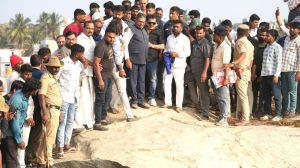Ramadoss146;s AIIMS
You don8217;t have to be Nehru to know that by giving up power you become more powerful

My country has been kind to me and has asked me to do many things, but the job I loved the most was being vice-chancellor of Jawaharlal Nehru University. Those who wrote the law setting up JNU did it with loving care. Its vice-chancellor has only one term of five years and then walks away into the sunset. At this time of the year one of my great successors will be coping with pressure from the highest in the land explaining that in the transparent process followed for selecting a thousand children out of the tens of thousands who apply, he has no scope for 8220;accommodating8221; anyone. Your leadership is as good as your vision, but you are truly autonomous. Therefore a minister asking the director of a premier research and teaching medical institute to give an 8220;explanation8221; for some statement he made has come as a shock.
Reform seems to be only for the market and private sector. A couple of years ago when an IMF paper contended that India had been growing fast from the eighties, NRI economists attributed the nineties8217; growth to globalisation, but for the eighties they wondered why. Each gave us his graduate school thesis as the reason. Reform started in the eighties with the Narasimhan Committee, which liberalised controls on the private sector and around two-thirds of the corporate sector went out of the clutches of babudom. There was a Sengupta committee, which was to liberate the public sector and institutions from the stranglehold of bureaucracy and politics. I was on both committees and in spite of the talk of MOUs8217; arm8217;s length relationships public institutions missed the reform bus.
This is unfortunate. Foreign 8220;experts8221;, who rubbished us for investing in high level research and knowledge based institutions created by our founding fathers, now talk of this as India8217;s strength in the global arena. It takes vision and sagacity to build institutions. They are not just brick and mortar, but are reliant on the strength of the women and men who man and support them. Rajiv Gandhi asked me to chair the committee which reports to Parliament on the Indian Statistical Institute8217;s budget. I read the parliamentary debates on the setting up of the ISI. Nehru Chacha, replying to the debate, made a great contribution on 8220;audit8221; looking at the past and the ISI looking to the future.
Kenichi Ohmae introducing the Next Global Stage in 2005 prophetically says: 8220;If, as I believe, the global economy is powered by technology, then knowledge is its precious metal. India8217;s strength, for example, can be substantially attributed to the sheer volume of its PhDs in science.8221; If we don8217;t show the strength to support knowledge based institutions now, the future is bleak.
There has been some media appreciation of the deprivation points JNU gives for OBC candidates, but it is wrongly said that this was done in the seventies, since anyway the OBC categorisation was not there then. JNU had an elaborate admission system, which was changed in its traumatic year of 1984. The OBC deprivation points were developed in the quinquennial admission policy review when I was vice chancellor.
It is not the system, but the way it was developed that I would like to refer to. In a monograph in the Nagoya Series on History of Civilisation and Culture, a Japanese scholar has described JNU as a merit based organisation with great democratic strength. In the Admissions Review it took us a year to develop the deprivation points, with a transparent and lengthy debate and discussion process, where the teachers, students union and many external experts participated. The system was developed without the education ministry intervening. Every proposal was hammered by the logic of 8220;practicality8221;, 8220;transparency8221; and of course the paramount need to follow more inclusive social goals. The best in the land participated. Sitaram Yechury and Prakash Karat were there as former JNU presidents. 8220;Voting8221; amongst expert bodies as a solution was a non-sequitor, since issues have to be discussed in detail and differences hammered out. Finally, if you were a girl, took your qualifying degree from a backward district and were poor, you got the maximum nine points and a poor OBC male got three. This kind of a process is simply not possible if all the rules are forced down by a bureaucracy. I am happy that the Moily oversight committee is giving the issue the attention and patience it deserves and I am sure it will use the experience of autonomous institutions.
The most venal pressures come in appointments and policies for the public sector. As power minister, I set up a committee under the no-nonsense M.R. Srinavasan, the former Atomic Energy Commission chief and then a member of the Planning Commission, to 8220;advise8221; the minister on the appointments in very powerful PSUs of the power sector. If the compulsions of coalition politics are making autonomy of public institutions a target, we need to build phalanxes against them. I don8217;t know the details of the governance structure of AIIMS, but to ask a distinguished surgeon to 8220;explain8221; his conduct in raising the autonomy issue is, to put it mildly, ill advised. If this happens at Delhi, state satraps already let loose will destroy us.
As India powers itself to roar into the 21st century it can do so only on the back of its great strengths, autonomous knowledge based institutions and not with the mindset of a thanedar. You don8217;t have to be Jawaharlal Nehru to understand that by giving up power you can actually become more powerful. The people at large appreciate leaders who support and build functioning institutions. A famous French leader was asked why he was at the rear of the crowd in the Paris disturbances of the late sixties. He is reported to have said that he led from the rear. The health minister is doing a superb job in many things and must place himself in line of leadership.
The writer is a former Union minister for power, planning and science and was also vice chancellor of JNU alaghicenet.net
- 01
- 02
- 03
- 04
- 05































